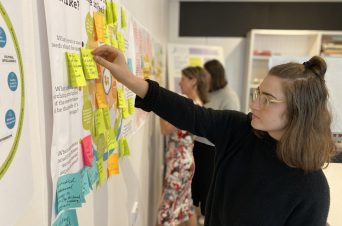A journey to recovery: co-designing the first therapeutic refuge service model in Western Australia
Peel refuge
With Department of Communities in Western Australia, Perth, Western Australia
Ensuring Family and Domestic Violence (FDV) services effectively meet the needs of women and children is more important now than ever before, particularly due to an increase in FDV both nationally and in WA due to the COVID-19 pandemic
With evidence demonstrating that both the rates of FDV are growing and that the needs of women escaping FDV are increasingly complex, the need for a service model that provides therapeutic responses and integrated services is stronger than ever.
All the evidence internationally is that we can expect that this pressure of COVID — the social isolation, the economic destabilisation that’s occurred — will actually give perpetrators of domestic violence additional opportunities to exercise control and power and to be violentWA Minister for Prevention of Family and Domestic Violence, Simone McGurk
The Peel region houses the first therapeutic women’s refuge in WA, with its design informed by insights generated from a co-design process that was facilitated by Innovation Unit, in partnership with the Department of Communities (the Department). It offers a specialist service for domestic violence survivors with co-occurring mental health and substance misuse concerns – survivors who require therapeutic responses not currently available within the existing women’s refuge accommodation services.
Over 54,000
incidents of family and domestic violence responded to in 2016/17 by the WA Police, an average of one incident every 10 minutes
50%
increase in reporting in the eight years from 2009/10
39%
of Specialist Homelessness Services Collection (SHS) clients who had a mental health issue also experienced FDV in In 2016-17
10%
of this group also experienced problematic drug and/or alcohol use
The problem
With WA experiencing the second highest rate of FDV across the country, the State Government’s Stopping Family and Domestic Violence policy included a commitment to establish two additional women’s refuges in areas with high service demand.
An analysis of current needs and service gaps demonstrated that there remained a cohort of women unable to access appropriate services in the metropolitan refuge sector, due to their complex circumstances and needs.
The impact of this service gap is that extremely vulnerable women are often turned away from refuges for having more than one presenting issue, resulting in rough sleeping or returning to a violent perpetrator. In other cases they have little choice but to hide the complexity of health issues, which results in services being ill-informed or ineffective, or are discouraged from seeking further support.
In addition, the lack of attention to the effects of trauma and domestic violence and their connection to substance misuse and mental health can lead to misdiagnosis, extended suffering and traumatisation. Women are often required to seek support from multiple service agencies that offer support around one area of concern. Each of these co-existing conditions has the potential to exacerbate the others and impairs a survivor’s ability to reduce exposure to violence.
With a growing awareness of the need for services for FDV, mental health and substance abuse to be integrated, the Department, in partnership with Innovation Unit, committed to designing the first Therapeutic Women’s Refuge in WA.
The therapeutic model manages each FDV survivor’s needs as a whole, providing person-centred, integrated responses that could facilitate recovery from the impacts of physical, psychological and emotional trauma for domestic violence survivors with co-occurring mental health and substance misuse concerns.
Significantly, the refuge’s therapeutic model will help to build the capability, resilience and safety of vulnerable women, helping them to get their lives back on track after experiencing violenceWA Minister for Prevention of Family and Domestic Violence, Simone McGurk
Our impact
As the Department looked to establish a new therapeutic service model that could better respond to the needs of women and children experiencing FDV, it was critical for Innovation Unit to co-design the new service with women with lived experience, decision makers, funders and service providers.
Through a rapid and iterative process, the therapeutic service was co-designed by 125 participants across 5 workshops, 14 interviews, an intensive 3-day symposium, and through a service user survey. In co-designing new refuge services, over 50 women and young people who had accessed FDV services shared their stories and ideas.
Privileging the voice of lived experience throughout the process resulted in new insights, questions, and conversations between the other co-designers from community and government sectors. These insights, which can be found here, informed the service design of the new refuge.
If the [co-design] process becomes embedded in the sector or becomes a more common experience then it has the potential of changing how we think and do our work in the FDV sectorCo-design participant
Amongst the significant outcomes were shifts in thinking: from case to person, from management to healing, and from short-term to an ongoing journey, to create more personalised, trauma-informed, and effective approaches to FDV services in the future.
As a result of the co-design process, the Peel Refuge opened its doors in November 2020 and will act as a prototype for similar services that may be established in the future.
Project team
Keren Caple
Chief Executive
(Australia New Zealand)
Claire Dodd
Senior Project Lead
Alison Gibson (Associate; Aboriginal Co-Designer IU ANZ)
Sarah Ward
Senior Innovation Consultant and Service Designer
Jethro Sercombe
Director Innovation Practice (Australia New Zealand)
Martin James
Director, Innovation and People
(Australia New Zealand)
Gareth Durrant (Associate)
Caution
Some people may find parts of this content confronting or distressing. Recommended support services include:
- 1800 Respect – 1800 737 732
- Lifeline – 13 11 14
- Women’s Domestic Violence Helpline – 1800 007 339
- Men’s Domestic Violence Helpline – 1800 000 599
Acknowledgement of Country
Innovation Unit acknowledges the Whadjuk and Bindjareb Noongar people as the Traditional Owners of the country upon which this project was conducted. We acknowledge the importance of paying respect to their land, their Elders past, present, and emerging, and the continuing cultural and spiritual practices of Aboriginal people.

